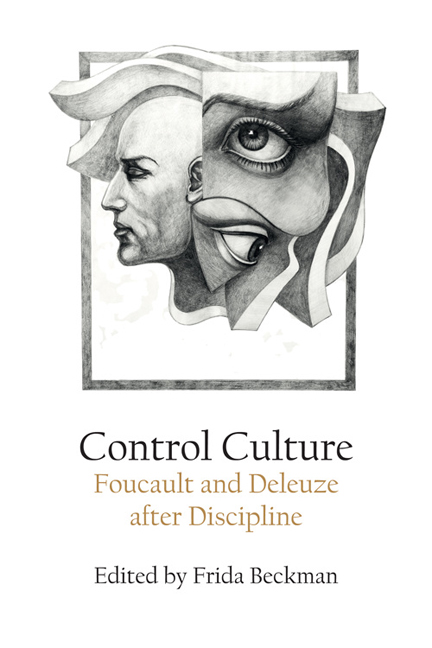Book contents
- Frontmatter
- Contents
- Acknowledgements
- Notes on Contributors
- Introduction. Control of What?
- 1 Notes from an Investigation of ‘Control Society’
- 2 Post-Mortem on Race and Control
- 3 Periodising (with) Control
- 4 Subjects of Sovereign Control and the Art of Critique in the Early Modern Period
- 5 Posthumanism, Social Complexity and the Political: A Genealogy for Foucault’s The Birth of Biopolitics
- 6 ‘That Path is for Your Steps Alone’: Popular Music, Neoliberalism and Biopolitics
- 7 Cinema in the Age of Control
- 8 Towards a ‘Minor’ Fascism: Panoptic Control and Resistant Multiplicity in TV’s Spooks
- 9 Species States: Animal Control in Phil Klay’s ‘Redeployment’
- 10 Control and a Minor Literature
- 11 Philosophy and Control
- Index
Introduction. Control of What?
Published online by Cambridge University Press: 05 May 2021
- Frontmatter
- Contents
- Acknowledgements
- Notes on Contributors
- Introduction. Control of What?
- 1 Notes from an Investigation of ‘Control Society’
- 2 Post-Mortem on Race and Control
- 3 Periodising (with) Control
- 4 Subjects of Sovereign Control and the Art of Critique in the Early Modern Period
- 5 Posthumanism, Social Complexity and the Political: A Genealogy for Foucault’s The Birth of Biopolitics
- 6 ‘That Path is for Your Steps Alone’: Popular Music, Neoliberalism and Biopolitics
- 7 Cinema in the Age of Control
- 8 Towards a ‘Minor’ Fascism: Panoptic Control and Resistant Multiplicity in TV’s Spooks
- 9 Species States: Animal Control in Phil Klay’s ‘Redeployment’
- 10 Control and a Minor Literature
- 11 Philosophy and Control
- Index
Summary
‘The world’, Gilles Deleuze says in a conversation with Antonio Negri in the spring of 1990, has ‘been taken from us’. It has been taken from us because we have lost our belief in it and without belief, we have closed down the potential to spawn ‘new space–times’, to make space for even the most modest events that evade control (Deleuze 1995: 176). Strikingly, but not unusually within the framework of Deleuze's oeuvre and in particular within his more political writings, this statement is at once bleak and constructive. In the same breath as it states that we have lost belief and thus the world, it offers at least the beginning of a suggestion of how to regain it. Deleuze notes the loss of belief but also reminds us that if we could only summon up the tiniest bit of it, this would enable us to ‘precipitate events’ and engender ‘new space–times, however small their surface or volume’ (Deleuze 1995: 176). Art plays a crucial part in such claims to hope. As he writes in his second cinema book; exactly because the world has turned into ‘a bad cinema, in which we no longer believe’, true cinema may be able to help us restore ‘our belief in the world’ (Deleuze 2013: 187). It is now three decades since Deleuze started flagging questions of control – in presentations such as ‘Having an Idea in Cinema/What is a Creative Act?’ in 1987 and ‘What is a Dispositif?’ in 1988, the conversation between Deleuze and Antonio Negri entitled ‘Control and Becoming’, published in Futur Antérieur in 1990, which is also the same year in which Deleuze's short but seminal article ‘Postscript on Control Societies’ was first published in L’Autre Journal. During the decades that have passed since then, the shifts away from disciplinary society that Michel Foucault had already predicted and that Deleuze articulated in these brief engagements have escalated in ways and on a scale that neither of them could have possibly imagined. So what is the status of our belief today? And what is the role of artistic and cultural expression in relation to it?
- Type
- Chapter
- Information
- Control CultureFoucault and Deleuze after Discipline, pp. 1 - 19Publisher: Edinburgh University PressPrint publication year: 2018

